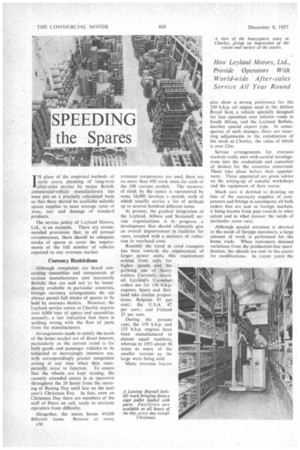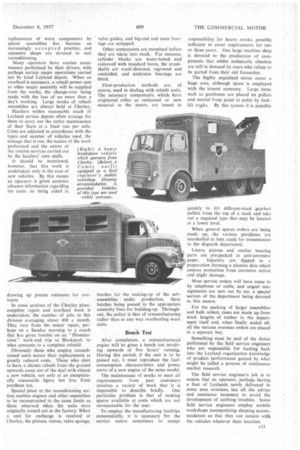SPEEDING the Spares
Page 74

Page 75

If you've noticed an error in this article please click here to report it so we can fix it.
IN place of the empirical methods of early years, planning of long-term after-sales service by major British commercial-vehicle manufacturers has been put on a precisely calculated basis so that there should be available suitable spares supplies to meet average rates of wear, tear and damage ofstandard products.
The service policy of Leyland Motors, Ltd., is an example. There are recommended provisions that, in all normal circumstances, there should be adequate stocks of spares to cover the requirements of the full number of vehicles exported to any overseas market.
Currency Restrictions
Although complaints are heard. concerning assemblies and coinponents of various manufacturers (not necessarily British) that are said not to he immediately available in particular countries, foreign currency arrangements do not always permit full stocks of spares to be held by overseas dealers. However, the Leyland service centre at Chorley exports over 4,000 tons of spares and assemblies annually, a fair indication that there is nothing wrong with the flow of parts from the manufacturers.
Arrangements made to satisfy the needs of the home market are of direct interest, particularly as the current trend is for both goods and passenger vehicles to be subjected to increasingly intensive use, with correspondingly greater congestion arising at any time when they unexpectedly cease to function. To ensure that the wheels , are kept turning, the recently extended centre is in operation throughout the 24 hours from the morning of Boxing Day until late on the next year's Christmas Eve. In fact, even on Christmas Day there are members of the staff of fitters on call, ready to extricate operators from difficulty.
Altogether, the stores house 49,000 different items. Because so many E30 common components are used, there are no more than 490 stock units for each of the 100 current models. The turnover of stock by the centre is represented by some 18,000 invoices a month, each of which usually carries a list of perhaps up to several hundred different items.
At present, the gradual integration of the Leyland, Albion and Scammell service organizations is in progress, a development that should ultimately give an overall improvement in facilities for users, coupled with a measure of reduction in overhead costs.
Recently the trend in road transport has been towards the employment of larger power units, this requirement arising from calls for higher speeds and the growing use of heavy trailers. Currently, nearly all Leyland's Canadian orders are for 150 -b.h.p. engines; Spain and Holland take similar proportions; Belgium 95 per cent.; the U.S.A. 87 per cent.; and Finland 15 per cent.
During the present year, the 150 b.h.p. and 125 h.h.p. engines have been manufactured in almost equal numbers, whereas in 1953 about 50 times as many of the smaller version as the large were being sold.
Many overseas buyers also show a. strong preference for the 230 b.h.p. oil engine used in the Albion Royal Scot, a vehicle specially designed for fast operation over inferior roads in South Africa, and the Leyland Buffalo, another special export type. In consequence of such changes, there are recurring adjustments in the constitution of the stock at Chorley. the value of which is over £3m.
Service arrangements for overseas markets really start with careful investigations into the credentials and capacities of dealers for the countries concerned. These take place before their appointment. Those appointed arc given advice on the setting-up of suitable workshops and the equipment of their stores.
.Much care is devoted to drawing up lists of the necessary supplies of components and fittings to accompany all bulk orders that are sent to foreign markets, it being known from past records to what extent and in what manner the needs of particular areas vary.
Although special attention is devoted to the needs of foreign customers, a large amount of work is performed for the home trade. When customers demand
variations from the production-line speci-fication, the. chassis are sent to the centre for modifications. In recent years the
replacement of worn components by spares assemblies has become an increasingly accept ed practice, and extensive shops are devoted to unit reconditioning.
Many operators have routine maintenance performed by their drivers, with perhaps certain major operations carried out by local Leyland depots. When an overhaul is necessary, a rebuilt power unit or other major assembly will be supplied from the works, the change-over being made with the loss of no more than a day's working. Large stocks of rebuilt assemblies are always held at Charley.
Hauliers within reasonable reach of Leyland service depots often arrange for them to carry out the entire maintenance of their fleets at a fixed rate per mile. Costs are adjusted in accordance with the types and number of vehicles used, the mileage that is run, the nature of the work performed and the extent of the routine services carried out by the hauliers' own staffs.
It should be mentioned, however, that this work is undertaken only in the case of new vehicles. By this means an operator is given accurate advance information regarding his costs, so being aided in drawing up precise estimates for contracts.
In some sections of the Chorley plant, complete repair and overhaul work is undertaken, the number of jobs in this division averaging about 400 a month. They vary from the minor repair, perhaps on a Sunday morning to a coach that has given trouble on an "Illuminations" week-end trip to Slackpooi,• to what amounts to a complete rebuild.
Obviously those who employ reconditioned units secure their replacements at greatly reduced costs. Those who elect to have a chassis rebuilt from the ground upwards come out of the deal with almost a new vehicle, not only at an exceptionally reasonable figure but free from purchase tax.
Special plant in the reconditioning section enables engines and other assemblies to be reconstructed to the same limits as those observed when the units were originally turned out in the factory. When a unit for exchange is received at Chorley, the pistons, valves, valve springs, valve guides, and big-end and main bearings are scrapped.
Other components are examined before they are taken into stoat. For instance, cylinder blocks are water-tested and resleeved with standard bores, the crankshafts are crack-detected, reground and renitrided, and undersize bearings are fitted.
Flow-production methods are, of course, used in dealing with rebuilt units. The necessary components, which have originated either as reclaimed or new material in the stores, are issued in batches for the making-up of the subassemblies under production, these batches being passed to the appropriate assembly lines for building-up, Throughout, the policy is that of remanufacturing rather than in any way overhauling worn units.
Bench Test
After completion, a remanufactured engine will be given a bench test involving upwards of five hours' running. During this period, if the unit is to be passed out, it must reproduce the fuelconsumption characteristics and power curve of a new engine of the same model.
The maintenance of stocks to meet all requirements from past customers involves a variety of work that it is impossible to describe briefly. One particular problem is that of making spares available at costs which are not unreasonable for the user.
To employ the manufacturing facilities economically, it is necessary for the service centre sometimes to accept
responsibility for heavy -stocks, possibly sufficient to coveirequirements for two or three years. One large machine shop is devoted to thr production of components that whilst technically obsolete are still in demand by users who refuse to be parted from their old favourites.
The highly organized stores cover a huge area, although space is employed with the utmost economy. Large items such as gearboxes are placed on pallets and moved from point to point by forklift trqcks. By this system it is possible quickly to lift different-sized gearbox pallets from the top of a stack and take out a required type that may be located at a lower level.
When general spares orders are being , made up, the various purchases are marshalled in bins ready for transmission to the dispatch department.
Liners, pistons and similar wearing parts are pre-packed in anti-corrosive paper. Injectors are dipped in a preparation forming a plastics skin which ensures protection from corrosive action and slight damage.
Most service orders will have come in by telephone or cable, and urgent consignments are sent out by air, a special section of the department being devoted to this means.
For the packing of larger assemblies and bulk orders, cases are made up.from stock 'lengths of timber in the department itself and, when finally scaled off, all the various overseas orders are placed in a separate bay.
Something must be said of the duties performed by the field service engineers who are responsible for feeding back into the Leyland organization knowledge of product performance gained by what might be called a process of continuous market research.
The field service engineer's job is to ensure that an operator, perhaps having a fleet of Leylands newly delivered in some area overseas, has all the advice and assistance necessary to avoid the development of teething troubles. Some field service engineers employ mobile workshops incorporating sleeping accommodation so that they can remain with the vehicles whatever their location.
























































































































